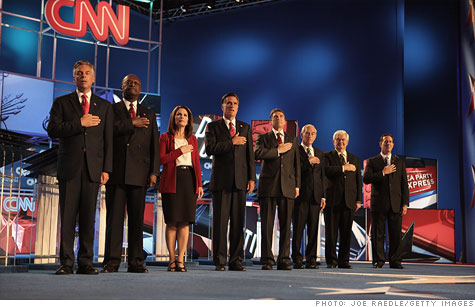Search News

Most of these Republicans don't like the Federal Reserve all that much.
NEW YORK (CNNMoney) -- The Federal Reserve. It's the one institution almost every Republican presidential hopeful loves to hate.
And during the latest CNN debate, the candidates came to play, attacking the central bank with rhetorical broadsides usually reserved for enemies of the state.
Rick Perry reiterated that Ben Bernanke might be guilty of treason for instituting a bond buying program. Michele Bachmann said she wants to put the central bank on "such a tight leash that they're going to squeak."
Other complaints: The Fed should be audited. Its policies are weakening the dollar. It has almost unlimited power.
And Ron Paul -- a notorious Fed basher -- wasn't even asked to weigh in!
Of course, this isn't the first time in the central bank's history it has been criticized by influential politicians in a very public setting. But now, the frequency of the criticism suggests the Fed is becoming a primary issue.
And that's just what the bank doesn't want.
"The Fed tries as mightily as it can to make its monetary policy decisions as apolitical as it knows how to do," said William Poole, a senior fellow at the Cato Institute and former president of the Federal Reserve Bank of St. Louis.
So what does the Fed really do anyhow? The central bank has essentially two jobs: Use monetary policy to keep inflation under control and unemployment rates low.
Politics is not part of the mission.
Some of the recent criticism of the Fed stems from the 2008 financial crisis and its aftermath, when the bank was forced to take extraordinary measures to help stabilize financial markets.
The bank made special loans, cut key interest rates and worked closely with the Treasury Department to backstop large financial institutions.
That role has opened Bernanke and company to complaints from candidates who view the Fed's actions as suspect. But not everybody is buying what the candidates are selling.
"It's inaccurate to suggest the Federal Reserve acted in a political manner during the economic crisis" said Steve Bartlett, CEO of the Financial Services Roundtable and a former Republican congressman from Texas. "They've acted in a transparent way and fulfilled their statutory responsibilities."
Perry, the current governor of Texas, apparently does not agree, and has stepped up his criticisms of the Fed to a level rarely seen.
"If this guy [Bernanke] prints more money between now and the election, I don't know what y'all would do to him in Iowa, but we would treat him pretty ugly down in Texas," Perry said last month in Iowa.
On Monday night, Perry stuck by his comments, saying it would be be almost treasonous for the Fed to print more money -- a reference to quantitative easing, a bond-buying program designed to boost the economy.
Bartlett said Perry's comments about Bernanke are not particularly helpful.
"The name calling -- I don't know if that's happened in the past. And it's bad," he said.
Another reason to attack the Fed? It's a soft target. The central bank doesn't often fight back -- and when it does, the language used is measured.
And the 2012 GOP primary is still a tight race. Political points are on the line.
"Most ... informed observers understand this kind of language does seep out of politicians' mouths from time to time when they are trying to gather votes and win office," Poole said.
"I think it's very unfortunate that it happens, and I think it's very unfortunate that voters seem to respond positively to it," he added.
But the Fed anger might die down as the race moves toward the general election and independent voters become the focus.
"I don't think it has legs as a campaign issue," Bartlett said. "It's only an issue if it has legs with the voters, not with the candidates." ![]()
| Overnight Avg Rate | Latest | Change | Last Week |
|---|---|---|---|
| 30 yr fixed | 3.80% | 3.88% | |
| 15 yr fixed | 3.20% | 3.23% | |
| 5/1 ARM | 3.84% | 3.88% | |
| 30 yr refi | 3.82% | 3.93% | |
| 15 yr refi | 3.20% | 3.23% |
Today's featured rates:
| Latest Report | Next Update |
|---|---|
| Home prices | Aug 28 |
| Consumer confidence | Aug 28 |
| GDP | Aug 29 |
| Manufacturing (ISM) | Sept 4 |
| Jobs | Sept 7 |
| Inflation (CPI) | Sept 14 |
| Retail sales | Sept 14 |